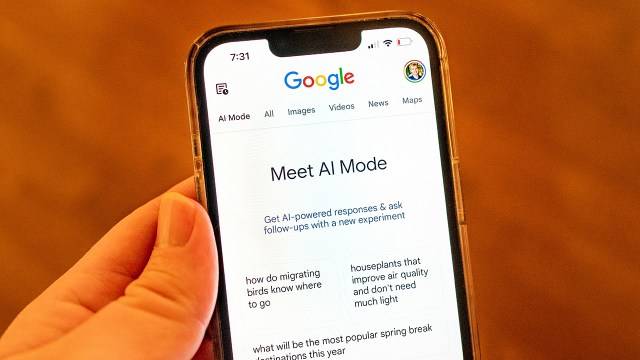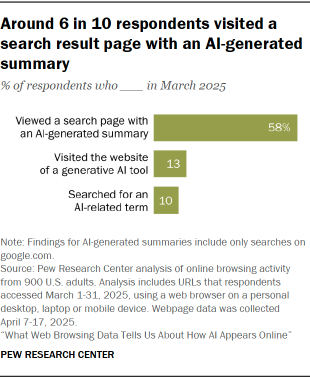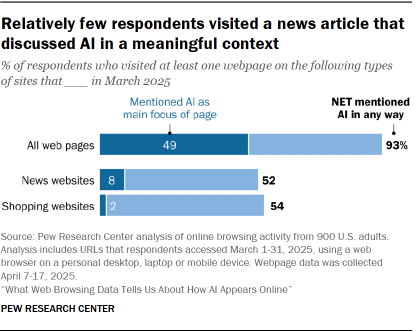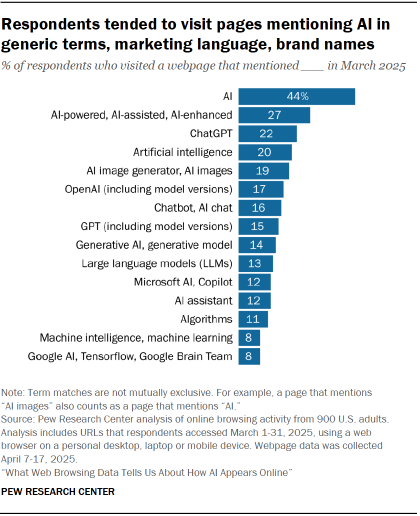
How we did this
The goal of this study is to better understand how, where and in what context Americans are encountering artificial intelligence as they browse the web. For this analysis, we purchased the March 2025 web browsing data of 900 U.S. adults. Each respondent is a member of KnowledgePanel Digital, an online survey panel whose respondents agree to install an app that tracks their online browsing behavior.
For each respondent, we received a list of all the URLs they visited using a web browser on a tracked device during the March 1-31, 2025, study period. For each of these approximately 2.5 million visits to 1.1 million unique URLs, we ran an automated script that retrieved the text a visitor to that URL might see, along with the page title and description.
First, we wanted to see how many of these URLs mention AI anywhere on the page. To do that, we checked if the page text included any on a long list of AI-related terms (refer to the Appendix for the full list of terms).
This is our broadest possible measure of whether a page mentions AI or offers some sort of AI functionality. It captures anything from a website for a generative AI tool like chatgpt.com, to a website with a single reference to AI on the page.
In addition to this broad read on how many webpages mention AI at all, we also wanted to see how many mention AI more prominently or indicate an active interest in AI on the part of the visitor. Some examples might include searches for AI-related terms on a search engine, or visits to sites like:
A generative AI tool such as chatgpt.com
A news article that focuses on or extensively discusses AI-related issues
A page for a product or service that extensively discusses its AI features
To identify these pages, we trained a model to indicate whether each page that mentioned AI did so in an incidental context or in a more substantive context along the lines of those listed above.
Although this study is based on the actual webpages respondents visited, it does have limitations that should be taken into consideration when interpreting its findings. First, the respondents were required to download a VPN to register personal devices for use in this study. As such, browsing on work devices or other untracked devices they might use to access the internet may not be captured. Second, the data only covers activity in web browsers, not other applications. Third, it does not include real-time algorithmically curated content (like the “For You” pages on X or TikTok) or pages that require a login to access.
As artificial intelligence (AI) advances rapidly and becomes increasingly commonplace in online spaces, the American public has shown a clear wariness about its potential impact on individuals and society.

Public opinion polling can help us understand Americans’ broad usage patterns and attitudes about AI, but we have less insight into what they see and read about this technology as they go about their daily online lives. To help shed light on this, we examined roughly 2.5 million webpage visits to 1.1 million unique URLs from a group of 900 U.S. adults who agreed to share their March 2025 browsing data.
Here are our main findings about how ordinary internet users are crossing paths with AI-related tools and content in their online browsing habits:
Most respondents encountered at least some AI-related content during the month – although most references were not especially prominent or in-depth. The vast majority (93%) visited at least one page that mentioned AI, even if that mention was brief or unrelated to the main focus of the page.
This share drops substantially for the subset of pages that primarily focus on AI – like the website of an AI chatbot, or a news article that extensively discusses AI-related issues. Around half of all respondents (49%) visited one such page during the month, though the typical person who looked at this type of content did so only a handful of times.
This pattern is found across several different types of web browsing activity, including querying search engines, reading the news and shopping online.

A small share of respondents used search engines to get information about AI. One-in-ten conducted an AI-related query on a search engine during the month.
But more often, search engines were a source for material generated by AI.
The vast majority of respondents conducted a search using a search engine like Google. And for 58% of respondents, at least one of these searches produced an AI-generated summary along with the traditional search results.
Some 13% of respondents visited a website for an AI tool like a chatbot, image generator or other generative AI tool.
To the extent that respondents visit news pages mentioning AI, such pages don’t typically discuss the technology at length. Around half of all respondents (52%) visited at least one page from a news outlet that contained an AI-related term. But most of these articles only mentioned AI in passing – for example, a brief reference to an AI company in a story about the stock market, or an AI-related term in a sidebar to the main article.
A far smaller share of respondents (8%) visited a news article in which AI was discussed in depth or was the primary focus of the story.
Respondents tended to visit pages that describe AI using generic terms, brand names, marketing language and product descriptions. The most common AI-related terms were broad references like “AI” or “artificial intelligence.” Other relatively common terms included “ChatGPT” and “OpenAI;” references to products “powered,” “assisted” or “enhanced” by AI; and “AI images” or “AI image generator.”
To be sure, these findings paint only a partial picture of all the ways Americans might encounter references to AI in their daily lives. Notably, our analysis does not capture things like content in mobile apps or web browsing on untracked devices – to say nothing of the AI references people might come across on TV or in their day-to-day interactions with others. But these findings help add context to how the public is learning about this complex and rapidly changing topic.
How common are visits to websites that mention AI?
The 900 respondents in this study visited a very large number of webpages during the month of March: 2,457,176 in total. Of these roughly 2.5 million page visits, 7% were to a page that contained at least one AI-related term.
Nearly every member of the study (93%) visited at least one page that mentioned an AI-related term. Among this group, the typical (median) respondent visited this type of page 60 times during the month. And as is true of many online behaviors, some respondents visited these pages far more than others: The top 20% of respondents by browsing activity visited pages that mention AI about 300 times, on average.
Respondents across a range of demographic groups are equally likely to see this sort of content, with no major differences by age, educational attainment or gender.
In-depth mentions of AI
Some pages that mention AI may further:
Highlight AI as a central focus of the page. Examples include an article that discusses new developments in AI technology and their implications for the global economy, or a story that talks extensively about a controversial AI-generated viral video.
Indicate an active interest in AI on the part of the person visiting the page. This could include things like a search query for an AI-related topic, or a visit to an AI tool like chatgpt.com.
Visits to these kinds of pages accounted for fewer than 0.05% of all page visits in this analysis. Although these visits are a tiny share of respondents’ web browsing overall, around half of respondents (49%) visited at least one such page over the course of the month. However, this was not a central part of most respondents’ web browsing activity. The typical respondent who visited at least one of these pages went to just three in total during the study period.
Mentions of AI on different types of sites
The roughly 2.5 million page visits in this study encompass a wide range of web browsing habits. Here are some of the ways that AI appears in specific corners of the web, based on the browsing data in this analysis. Read the methodology for more details about the specific sites that were included in each category.
News websites

Around half of the respondents in this study (52%) visited a news webpage that mentioned AI. By and large, these pages tend to mention AI only in ways that are incidental to the main story or article. This might include a single mention of AI in an otherwise unrelated story, or an AI-related term in a recommended headline on the page’s sidebar.
Just 8% of respondents visited a news webpage that discussed AI in a meaningful context. Some examples actually visited by study participants include:
Shopping websites
Around half of respondents (54%) went to a page on one of 18 major shopping websites that contained a reference to AI. These references were often mentions of AI-powered product features or AI-generated summaries of customer reviews.
Amazon.com, a domain visited by 63% of respondents in March, accounts for a large portion of pages in the latter category. One of the most-visited sites in the world, Amazon has AI-generated summaries of customer reviews for many products.
Social media
A great deal of content on social media today is algorithmically curated or requires a login to access it. As such, much of the social media content viewed by respondents was inaccessible to our data collection methods. Even so, three-quarters of all respondents visited a social media page with an AI reference. Many of these visits were to pages on facebook.com that, during the study period, contained a link to the company’s Meta AI tool in the sidebar.
Search results and AI-generated search summaries
Around six in ten respondents (58%) conducted at least one search engine query that produced an AI-generated summary of results. Around two-thirds (65%) conducted a search that produced an AI reference anywhere on the results page, regardless of whether the search itself pertained to AI or not.
One-in-ten respondents made a search that directly related to AI. The most common queries involved various combinations of the words “AI” and “ChatGPT.”
Generative AI tools
Some 13% of respondents – and 20% of those ages 18 to 29 – visited the website of an AI chatbot at least once during the month of March. This category includes tools like OpenAI’s ChatGPT, Google Gemini and Perplexity AI.
In an August 2024 Pew Research Center survey, one-third of U.S. adults reported having ever used an AI chatbot.
Language used on pages mentioning AI

The largest shares of respondents in this study visited pages that mentioned AI using generic descriptors like “AI” or “artificial intelligence,” as well as marketing phrases like “AI-powered,” “AI-enhanced” or “AI-assisted.” And around one-in-five visited a page that mentioned ChatGPT specifically.
At the page level, the distinct pages in this collection with any mention of AI included an average of two unique terms and three total terms from our list. But around one-in-five of these pages (22%) only match for the single term “AI.”

